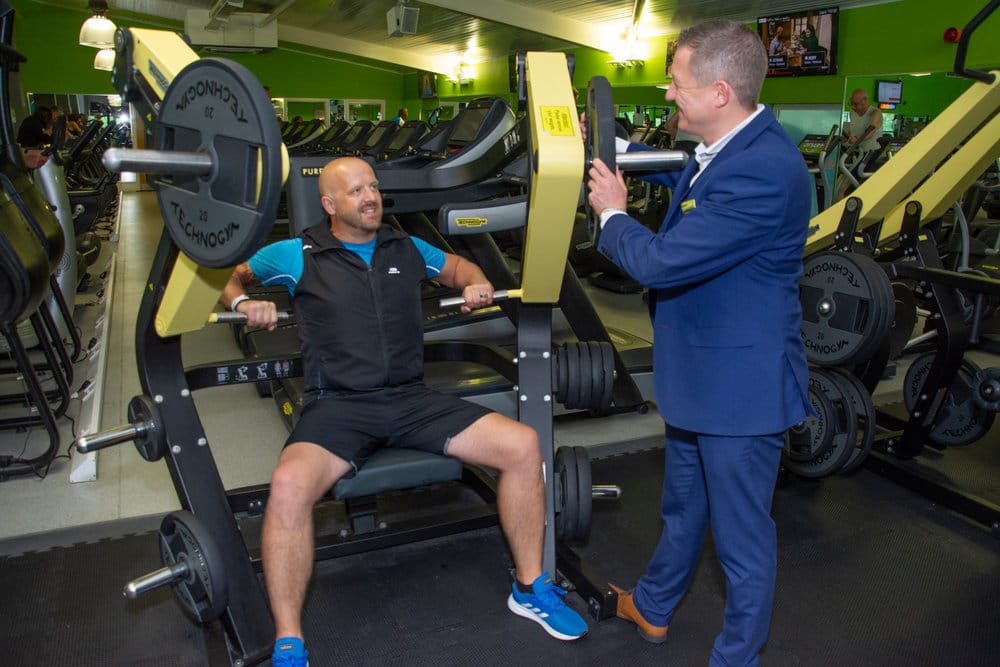By David Saunders, Health Editor | UPDATED: 08:28, 26 June 2020
RAF man Paul Twitchell is one of the first to take advantage of Duncan Bannatyne’s offer of free health club membership for veterans with PTSD.
The 45-year-old, who lives in Telford, currently is on sick leave and will be medically discharged from the RAF, to which he has belonged since 1996, in December.
As part of Squadron 5131 bomb disposal squadron, based at RAF Wittering, Lincolnshire, Paul did three tours of duty in Iraq during which mental health problems were triggered by several traumatic experiences.
He was part of an immediate response squad, which was given ten minutes’ notice to move in on helicopters and rescue or help injured service personnel or locals to get to safety. The role of the bomb disposal teams was essential because of the prevalence of minefields.
After a young soldier, who was shot in the head, died at his feet in a helicopter in 2004, Paul began experiencing distressing flashbacks. Four years later this was exacerbated when a bullet, fired by a sniper, missed him by inches embedding itself in a nearby wall.
Paul explained that, at first, he did not think what he was feeling was a major problem and that everyone suffered similar reactions, but that no-one talked about it and it should be a case of just trying to ‘crack on’.
For 13 years, he self-medicated with alcohol and his mental health deteriorated to the point where he attempted suicide.
He realised he needed help and approached the RAF, which, he said, has provided fantastic care and support. He was diagnosed with PTSD in 2017 and since then has been receiving therapy and medication to help alleviate the symptoms.
Last year Paul was part of Team GB at the Invictus Games in Sydney, where he won a silver medal as part of the sitting volleyball team, which involves able-bodied members as well as amputees.
He credits his wife Cindy, with whom he hasan eight-year-old son, William, for helping turn his life around.
Paul, who extols the virtues of sport and exercise for a healthy mind and body, is gearing up to take part in the 2020 London Marathon. He also runs Telford Eagles, Shropshire’s first sitting volleyball team, which plays in a national league.
He said: “The power of recovery through sport and exercise is second-to-none. I find it very therapeutic. I like to set myself goals.”
After attending the Shrewsbury health club several times, he had to stop for a while after his mental health took a turn for the worse, but he now is back on track after a change in medication.
He loves spinning classes, doing cardio, and being in the pool when he wears waterproof headphones as he finds it relaxing to listen to music while swimming.
He said: “If I ever met Duncan Bannatyne I would give him a big hug for appreciating what veterans have given to the country. It is so nice to be recognised.
“The health club is the best I have ever been to and the staff make you feel so welcome and special.”
Duncan Bannatyne gave his backing to the Sunday People’s Save Our Soldiers campaign and offered hundreds of free memberships for veterans with PTSD, with every one of his 72 health clubs taking part.
Duncan, 70, told the Sunday People: “I truly believe our armed forces are the best in the world. I think they do an amazing job and the bravery that comes with doing the job they do is outstanding.
“If I can help in a small way such as giving a free membership to help combat PTSD, then I am more than happy to do that. It is something that is very dear to me.”
Duncan’s dad William endured three-and-a-half years in a Japanese prisoner of war camp in the Second World War and was starving to death before liberation in 1945.
William, an infantryman in the Argyll and Sutherland Highlanders, had been captured while fighting Japan’s invasion of Malaya and Singapore in 1942.
Duncan said: “My father was somebody who did not really talk about his time as PoW. However, over the years I did get bits out of him and when I hear what he endured it makes me so proud to have seen how brave he was.”
Duncan’s military background is one of the reasons he feels strongly about the plight of troops with PTSD.
